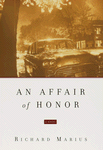
|

An Affair of Honor
|

|
FICTION:
- After the War
- Bound for the Promised Land
- The Coming of Rain
NONFICTION
- Luther
- Thomas More
- A Writer's Companion
EDITOR
- The Columbia Book of Civil War Poetry
|
 |
|
|
|
 |
|
|
 |
|
|
 |
 |
 |

|
In this powerful novel—the capstone to Richard Marius’s illustrious career—a gripping double murder propels the small, Bible-obsessed town of Bourbonville, Tennessee, into connection with the wider society opening up in the years following World War II.
At the center: Charles Alexander, twenty, groomed from birth by his mother to be a Baptist minister,
teetering on the edge of his faith. In his last year of college, working late one night at the newspaper office, he accidentally witnesses the murders. The killer is Hope Kirby, World War II hero, member of a large mountain clan of farmers, who has discovered his wife’s infidelity. Although Kirby’s code of honor requires that he exact vengeance, it won’t allow him to kill an innocent bystander, and Charles goes free, promising not to tell what he’s seen.
But Charles does tell, and we watch, fascinated, as a trial, an appeal, and a new terror unleashed on the countryside draw the entire county into the action. Among the people most closely involved: the skillful, overweight, hard-drinking lawyer for the defense; two Baptist preachers—one liberal, one a strict constructionist—each with a secret to hide; a lady banker determinedly headed for trouble; a big-hearted good-
old-boy sheriff; Charles’s disturbingly freewheeling, freethinking sometime college girlfriend. Most importantly, we see the Kirby clan: Pappy, whose extraordinary patience, hard work, and self-reliance cause his hardscrabble farm to prosper until he’s turned out by the coming of a national park; and the five Kirby sons, who are trying hard to make a new place for themselves in the town.
As these and others play their parts in the affair of honor, we see Charles and the Kirbys begin to reexamine their dramatically opposing but equally encapsulated ways of viewing life—fundamentalist Christian and ancient “code of the hills.” And as the novel draws to its climactic and satisfying close, we see them—and finally the entire town—profoundly, permanently changed.
"A rich and wonderful novel . . . an old-fashioned blockbuster chock full of wildness and enough excitement for three novels . . . It moved me, made me laugh out loud, broke my heart, and made me so tense that at several points I could barely turn the pages . . . The man is a consummate storyteller and a loving, wise, and compassionate writer."
-Robert Ward, New York Times Book Review
"It's not merely good. It is amazingly good . . . a feast of Americana, rich in history and biography, riveting in plot, lavish in humanity, graced at all points by keen intelligence and masterful prose."
-Andy Solomon, The Boston Globe
"He has created a blockbuster . . . After the War earns its accolades because of its broad vision and superb storytelling . . . It is a tribute to Richard Marius's talent that after all he writes you want to hear more, not less."
-William Rodarmor, San Francisco Chronicle
"Sumptuous . . . a big novel packed with classic themes: the deadly consequences of ambition and greed; the heaven-bound quest of the soul; industrial progress vs. the agrarian ideal; the ties that bind parents to children, men to women, people to place."
-Margarita Fichtner, The Miami Herald
"A loving if unrelenting vision of the South . . . both a big, old-fashioned book stuffed with hardy characters and adorable eccentrics, and a daring assault on all such sentimentality."
-Paul Skenazy, The Chicago Tribune
"Casts a burnished spell. The moonshine whiskey is potent, and religion is as lethal as the Spanish Flu that rakes the country in 1918. The Tennessee townpeople provide plenty of Scotch-Irish humor. This is fine, somber writing."
-Cary Holladay, The Philadelphia Inquirer
"'Magnificent' describes the expansiveness of Mr. Marius's vision and the eloquence of the captivating prose he sculpts with masterly precision to convey that era's [World War I] multifaceted complexity."
-Bob Summer, The Atlanta Constitution
"I flat-out love this book-it is poignant, wise, commonsensical, mature, and insightful. In short, Richard Marius has given us a great and glorious novel, fun to read and yet a true work of art which deserves a permanent position on major literary lists."
-Tom C. Armstrong, The Nashville Tennessean
"One of the most remarkable novels I've ever read, a panoramic saga of life and love and hatred and violence, a compelling story that is almost impossible to put down . . . deserves to be recognized as one of the great contemporary novels."
-Don McKinney, The Hilton Head Packet
|
|
 |
|
|
|

